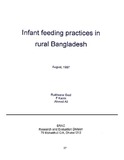| dc.contributor.author | Gazi, Rukhsana | |
| dc.contributor.author | Karim, Fazlul | |
| dc.contributor.author | Ali, Ahmed | |
| dc.date.accessioned | 2020-01-16T04:39:17Z | |
| dc.date.available | 2020-01-16T04:39:17Z | |
| dc.date.issued | 1997-08 | |
| dc.identifier.citation | Gazi, R., Karim, F., & Ali, A. (1997, August). Infant feeding practices in rural Bangladesh. Research Reports (1997): Health Studies, Vol - XXI, 57–76. | en_US |
| dc.identifier.uri | http://hdl.handle.net/10361/13578 | |
| dc.description.abstract | This study was part of a longitudinal study on the consequences of low birth weight
(LBW) babies which was carried out in three unions of Manikganj district during 1993-
1994. This study aimed to assess the breastfeeding practices among infants and to
compare the weaning practices among LBW and normal birth weight infants. A total of
644 infants were registered within 48 hours of birth and they received monthly follow-up
visit upto one year of age. Although breastfeeding was universal in the study population,
detrimental feeding practices, such as the administration of pre-lacteal foods (75%) and
rejection of colostrum (1 1 %) were prevalent among the mothers. There was a delay in
initiation of first breastfeeding. Although 77% of the mothers exclusively breastfed their
babies at the first month, the prevalence of exclusive breastfeeding decreased to 50% by
the third month. The main reason for giving additional foods was that the mothers felt
breastmilk was insufficient. A significantly higher proportion of LBW infants received
additional feeding than the normal infants. It might be due to the mothers perception that
the additional foe<i to thin looking LBW babies was needed for their quick recovery and
proper growth. Health workers should receive practical training on breastfeeding
counselling. Weekly follow-up and monitoring of breastfeeding practices for at least one
month can be introduced in the breastfeeding interventions. Audio-visual aids can be
used to teach mothers how to breastfeed effectively. LBW babies require more frequent
and short feedings. Expressed breast milk can be fed to LBW babies who can not suck. | en_US |
| dc.language.iso | en | en_US |
| dc.publisher | BRAC Research and Evaluation Division (RED) | en_US |
| dc.subject | Low birth weight (LBW) | en_US |
| dc.subject | Breastfeeding | en_US |
| dc.subject | Infant feeding | en_US |
| dc.subject | Rural Bangladesh | en_US |
| dc.subject.lcsh | Infants--Nutrition | |
| dc.subject.lcsh | Breastfeeding | |
| dc.subject.lcsh | Health, Nutrition, and Population Program (BRAC) | |
| dc.title | Infant feeding practices in rural Bangladesh | en_US |
| dc.type | Research report | en_US |

